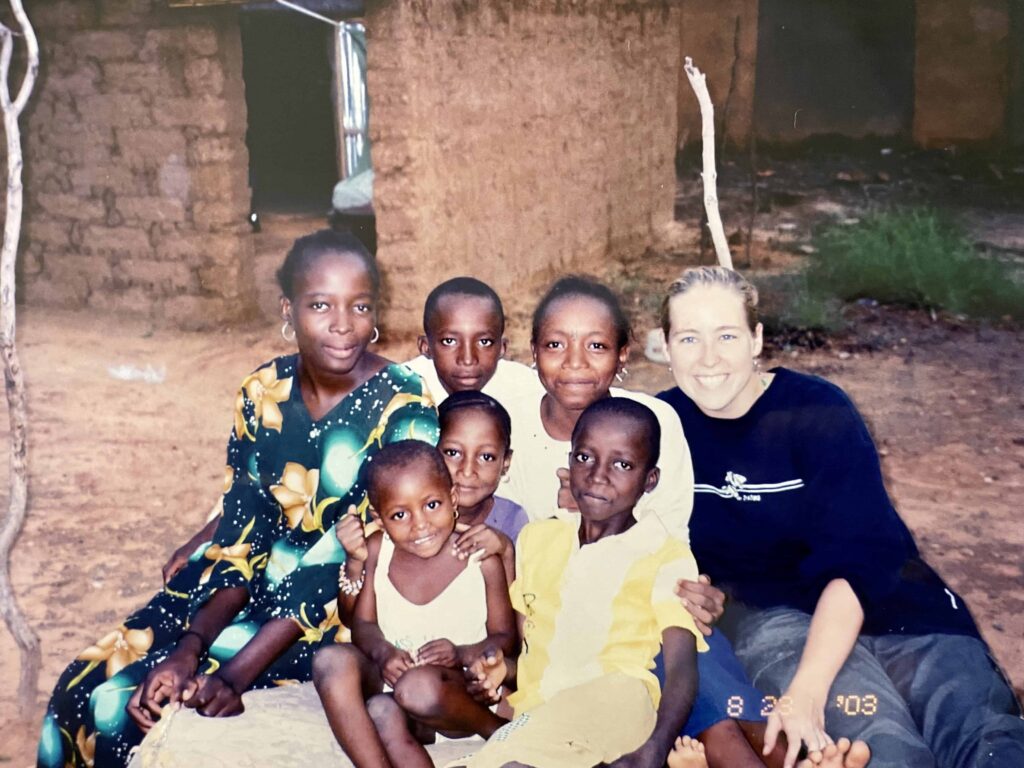My literacy journey began 20 years ago as a Peace Corps volunteer in rural Niger. It was there that I saw the dynamics of literacy up close and how a few key elements can make all the difference for young learners. In the decades since, I’ve seen these fundamentals of literacy hold true and play out in the countries where I have worked.
 Language and literacy are intricately intertwined
Language and literacy are intricately intertwined
The village where I lived on the edge of the Sahara was mostly Hausa-speaking. Hausa was used in the market, on the radio and tv, and for most business. However, French is the national language in Niger and the language of instruction.
One day, some of my neighbor kids recited a beautiful poem in French that they had learned at school. When I asked them what it meant, each one of them proceeded to shrug their shoulders and say they had no idea.
I have always loved languages and recognized the power of language, but it was not until that moment that I realized the critical role that language plays in literacy; because how can a child understand a text in a language they do not speak?
- Reading comprehension requires decoding and language comprehension
To read with comprehension, one must both understand the language being read AND be able to interpret the symbols on the page into the sounds they make, otherwise known as decoding. Both skills are required, and one alone is not sufficient.
Imagine for example a child who has a large vocabulary in Spanish and then is handed a book in Spanish. If he has never learned to decode the words on the page, even though his understanding of Spanish is perfect, his reading comprehension will be null.
Now imagine a child who already knows how to read in their home language of Mam. When this child is presented with a text in Spanish, even though they already know how to decode in Mam, since they do not understand Spanish, their reading comprehension will be zero. Children must develop both decoding and language comprehension to become skilled readers.
- Literacy is in fact rocket science
Okay, maybe not literally rocket science, but so often we hear that literacy is not really all that complicated when in fact this could not be farther from the truth. Although language ability comes naturally to humans, and babies learn speech through listening and observing those around them, the same is not true for literacy.
You cannot just surround a child with books or read to a child and expect them to learn to read. Literacy is a science — and although we are still learning more every day about how learning to read happens in the brain and the most effective strategies to support reading development, we know so much more now about the science of reading and how to facilitate reading with comprehension.
- Literacy does not happen in a vacuum
In an ideal world, children are spoken to with rich language from the time they are in the womb, interesting reading materials in a language they understand abound in their homes and communities, they are read to frequently by siblings and parents, attend schools with full bellies, have teachers who are trained to teach reading, and experience school in a safe setting where they are protected and able to just be children.
After 20 years of working in international development, I know that most children must try to learn to read in the midst of circumstances far from this ideal.
Literacy interventions must help teachers follow the science of reading but at the same time they will be much more effective if they also ensure students have access to books, collaborate with school feeding programs to make sure students are well nourished, and work with parents to understand how they can support reading at home from the very earliest days.
Putting literacy to work
Supporting children to learn to read in languages they speak and understand is core to our model, and we are putting it in practice in places like Ethiopia, Nigeria and Somalia.
We provide reading materials in the languages children speak, train teachers in the science of reading, and bundle our reading programs with other complementary activities such as psycho-social support for children who have experienced trauma, as is the case in many of the crisis-affected areas where Creative works.
We also work to strengthen education systems in every country where we operate as this is the only way that reading improvements will be sustained over time.
Although much has been done, there are still millions of children attending school and attempting to learn to read in languages they do not speak and without books to support them, and there are teachers who have never been trained on how the science of reading can be implemented in a classroom.
I am reconfirming my commitment to ensuring that, 20 years from now, I will see a world where children are given the opportunity they need to learn to read by the very education systems that were meant to support them.
Rebecca Stone is the Director of Creative’s Education Technical Unit.

